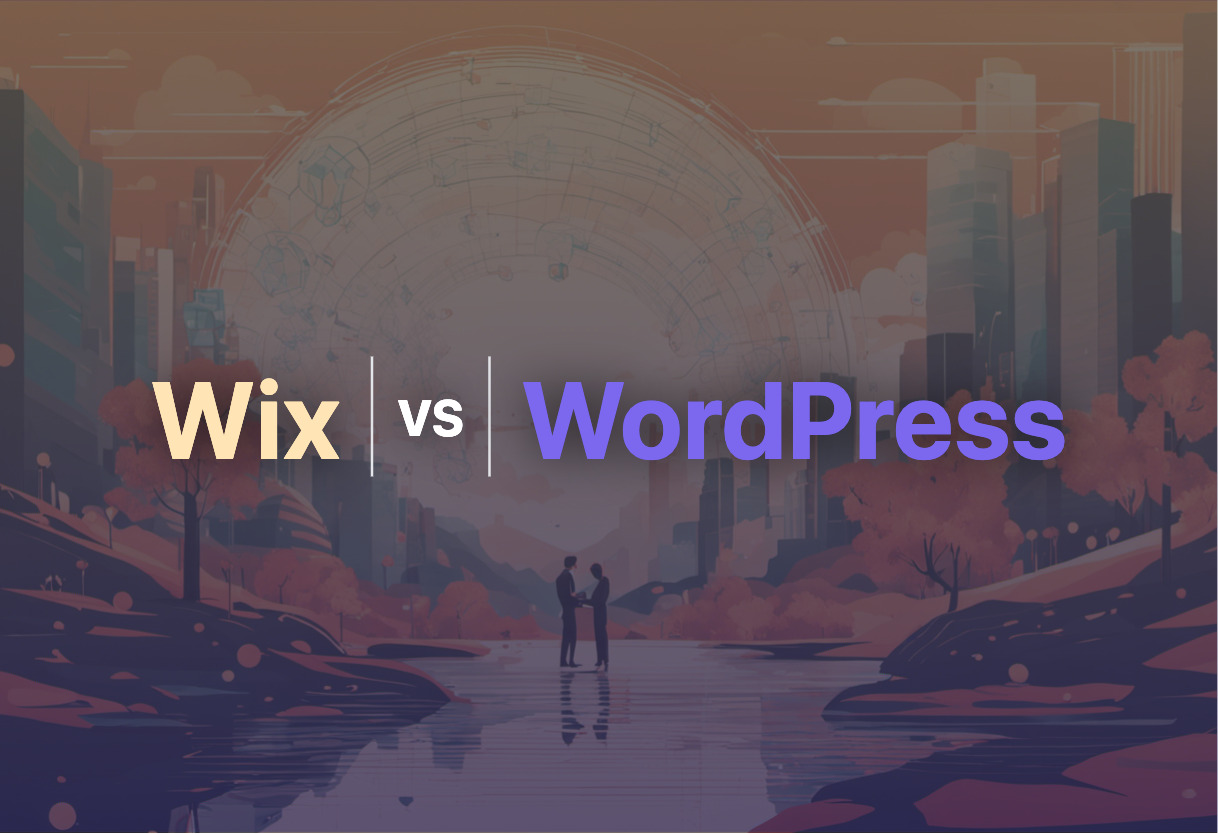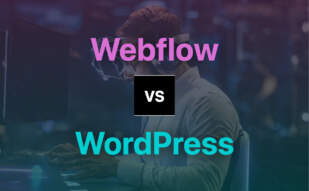If you want a hands-on, highly customizable website and have the time & technical prowess, WordPress with WooCommerce is a commanding choice. However, if ease of use, intuitive management, and rapid deployment is key, choose Wix eCommerce due to its robust and user-friendly platform.

Key Differences Between Wix and WordPress
- Design and Customization: Wix boasts of 500+ designer-made templates, while WordPress requires custom design,
- Development Time: Wix offers rapid launch, WordPress might need time and additional costs for custom development,
- Management: While Wix is managed via an owner app, WordPress requires you to manually perform updates,
- Costs: Wix has distinctive pricing plans, whereas costs for WordPress extend beyond a basic plan to domain, design, plugins and hosting,
- E-commerce Support: Wix’s inherent e-commerce platform streamlines store setup, WordPress relies on WooCommerce to convert into an e-commerce site,
- SEO: Both platforms have SEO tools, with WordPress offering the YoastSEO plugin to optimize your site.
| Comparison | Wix | WordPress |
|---|---|---|
| eCommerce Platform | Wix eCommerce platform with capabilities to sell via multichannels and manage shipping, payments, and marketing | WordPress eCommerce via the WooCommerce plugin, with options for storefront creation, multiple payment gateways, and easy tax calculation |
| Cost | Various pricing plans suitable for different business needs | Costs include domain registration, SSL, custom design, development, plugins, marketing, hosting. An established plan starts at $25,000 annually through WordPress VIP |
| Product Management | Offers up to 50,000 products in your online store and manages orders, fulfilments, and shipping | WooCommerce on WordPress allows inventory management and real-time shipping prices. |
| Payment Solutions | Supports 80+ payment solutions including Wix POS | WooCommerce Payments, Stripe, PayPal, Afterpay, Authorize.Net, Square, Amazon Pay |
| Sales Transactions | Handles high-volume sales, up to 750 transactions per second | Transaction fees from WooCommerce and Paypal for 2.9% + $0.30 per transaction |
| Templates | 500+ designer-made templates | Over 1,200 eCommerce-focused WordPress themes for customization |
| SEO Tools | SEO-friendly tools for enhanced visibility in search result pages | SEO-friendly with the help of plugins like Yoast |
| Scalability | Flexible infrastructure for businesses of all stages, including startups and global operations | Scalable via various plugins and options |
| Support | Renowned customer support | Plugin compatibility can be occasionally problematic |
| Site Updates and Enhancements | Regular updates and enhancements provided | Convenient automated updates and a staging site for product testing |
What Is Wix and Who’s It For?
Wix is a robust and intuitive eCommerce platform, designed for businesses at all stages, from startups to those handling global sales. It effectively serves online stores, facilitates multichannel sales, and handles high-volume transactions securely. Wix offers comprehensive business solutions, whether transitioning from brick-and-mortar to online or scaling an existing digital storefront.

Pros of Wix
- Provides 500+ designer-made templates and 80+ payment methods.
- Integrated SEO-friendly tools for enhanced visibility.
- Responsive customer support, regular updates, and scalability for growing businesses.
- Offers analytics, insights and marketing tools.
Cons of Wix
- May lack specific features or integrations for specialized business needs.
- Templates, once selected, cannot be changed without rebuilding the site.
- No native email service.
What Is WordPress and Who’s It For?
Powering 40% of websites globally, WordPress is a content management system preferred by businesses of varying size and industry. It’s a robust platform particularly embraced by those wishing to create unique, bespoke digital experiences. WordPress extends its functionalities by integrating plugins, such as WooCommerce for eCommerce, offering a tailored solution for selling products online.

Pros of WordPress
- Broad customization possibilities with over 1,200 eCommerce WordPress themes.
- WooCommerce plugin facilitates product page customization, multiple payment gateways, and easy tax calculation.
- Built-in SEO tools, automated updates, and staging sites for product testing.
- Offers tools for marketing automation, inventory management, shipping prices, and tracking codes.
Cons of WordPress
- Primarily a CMS platform and not dedicated to eCommerce, requiring additional plugins for this functionality.
- Occasional compatibility issues with plugins.
- Costs associated with custom designs, development services, plugins, and hosting.
- Transaction fees applied for WooCommerce and PayPal transactions.
Wix vs WordPress: Pricing
Wix provides cost-effective plans tailored for various eCommerce needs, while WordPress is a flexible option characterized by diverse pricing, driven largely by third-party integrations and services.
Wix
Wix presents multiple pricing plans tailored to specific business requirements. Their eCommerce system supports up to 750 transactions per second, catering effectively to high volume sales. As a plus, there are no transaction fees. The cost is inclusive of features like 500+ designer-made templates, 80+ payment solutions, marketing and SEO tools, site analytics, multichannel sales support, order management handling, and promotional tools. It also provides customizable features and a wide range of third-party apps via the Wix App market.
WordPress
WordPress pricing varies depending on the range of services utilized. Basic costs covering domain registration, SSL, and essential necessities range between $15 and $50 per month. Additional specifications such as custom design and development services can increase the cost significantly, ranging from $1,000 to over $25,000. Monthly costs for plugins, marketing, and hosting are additional. Transaction fees from WooCommerce and Paypal apply at 2.9% + $0.30 per transaction. For high-end services, established plans are available starting from $25,000 annually through WordPress VIP. However, the platform does offer a free domain for one year.
Which One For Your Needs? Wix or WordPress?
Choosing the right platform for your online endeavor largely depends on your specific needs. Both Wix and WordPress offer robust solutions, however, the choice narrows down to your requirement, prowess, and budget.
Small Business Owners
If you’re starting a new online business, Wix is your go-to platform. With up to 750 transactions per second, effortless cross-border selling, and a user-friendly drag-and-drop editor, it is ideal for non-tech owners. Wix also offers 80+ payment solutions, a robust platform for up to 50,000 products and reminds users of its superiority with convenient features like a ‘Buy Now’ button and a currency converter.

Developers and Web Designers
WordPress, with its massive 64% CMS market share, is the undisputed champion for web designers and professionals who need unlimited customization and scalability. Despite higher initial costs, WordPress’s endless array of plugins, including the market-dominating WooCommerce, makes it a powerhouse for design and functionality.

Advanced eCommerce Businesses
If your operations involve advanced eCommerce, Wix offers a velocity that others find tough to match. It conveniently syncs online store data with in-person sales and is a dream-come-true for those with brick-and-mortar businesses going digital. Plus, Wix POS is a jewel that, combined with its SEO-friendly tools, adds to its appeal. On the other hand, WordPress needs the WooCommerce plugin for eCommerce activities.

If your aim is for a DIY, less-technical route to kickstart your online business, Wix’s intuitive, cost-effective platform is your best bet. However, if you seek an engine with limitless customization, WordPress may entail initial costs, but the power it provides is unmatched.
Patrick Daugherty
Content writer @ Aircada. Merging AR expertise with a love for late-night gaming sessions.





